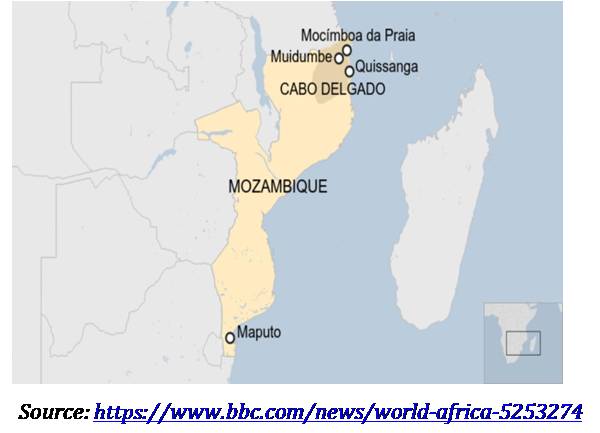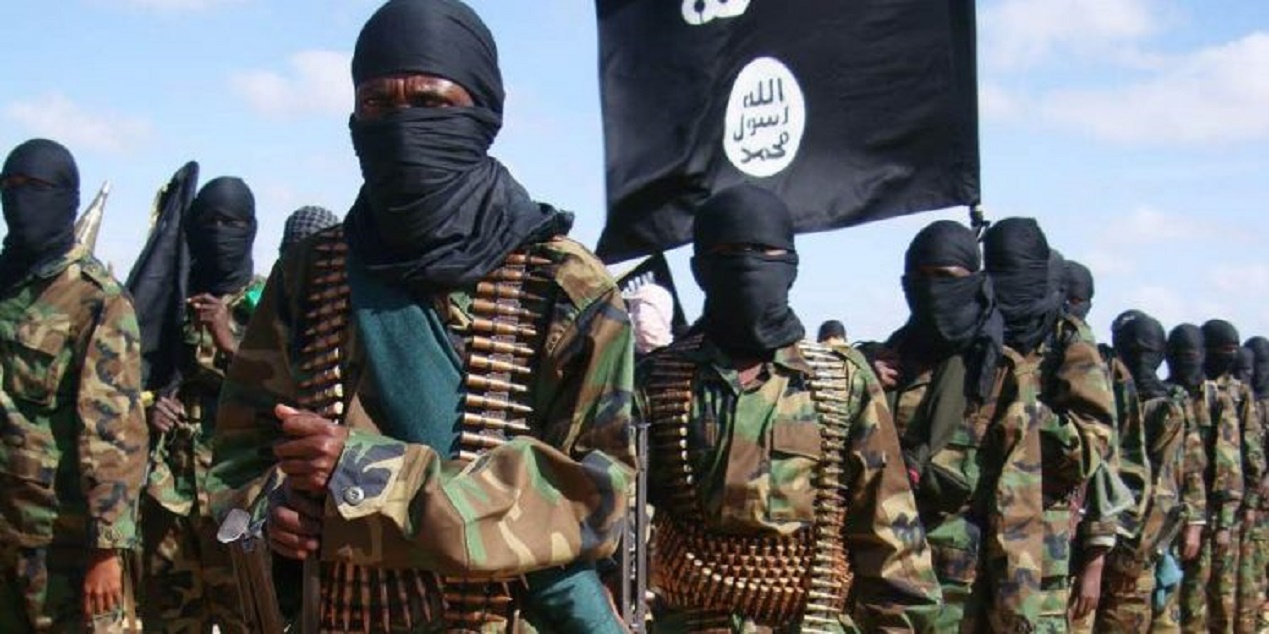The Republic of Mozambique since 2017 has witnessed a rise in terrorist attacks. The country witnessed its first attack on 5th October 2017 in a small town of Mocimboa da Praia - which lies in the Cabo Delgado province of Mozambique1. Since then there have been several attacks by insurgent groups linked to Islamic State (IS) that have also spread to other districts posing a major security threat to the country and the region. The fight is mainly between the militants to establish an Islamic state in the region, and the targets have mainly been the civilians. The recent attack by Islamist insurgents on 24th March 2021, in Palma in the Cabo Delgado province is till date the most serious and deadly since 20172. This attack directly threatens the country's economic future. What are the reasons behind the growing insurgency in the Cabo Delgado province? What are challenges faced by the people and what's the way forward. The paper is an attempt to analyse the above mentioned issues.

Reason behind the Growing Insurgency in the Northern Cabo Delgado
There exists an ongoing conflict in the Cabo Delgado province of northwest Mozambique, and over the years the region has become a hub of Jihadist terrorism with string of attacks claimed by the Islamic State (IS). The Ansar al-Sunna/Ahlu Sunna wal-Jama (ASWJ)/locally known as the Al-Shabab, with no practical connection to the Somali rebel organisation; has emerged as a non-violent organisation since 20173. The organisation is considered to be the Mozambique affiliate of the IS terror group and has been at the centre of the rise of extremism, associated with the attacks in the North province of Mozambique.
After the first attack in Cabo Delgado on 5th October 2017, many villagers were forced to move to nearby provinces leaving the place deserted. In the year 2018-2019 there was a sharp increase in attacks in north Mozambique. Moreover in November 2020, fifty people were beheaded in the Cabo Delgado province by the rebels of the country4. The continuous growth in insurgency that began in north Mozambique a few years back has resulted in many fatalities and mass displacement. Several factors have catalysed an upsurge of violence and the prevalence of insurgency in the region. The main cause that has led to insecurity, instability and spread of terrorism and extremism in the region is poverty and underdevelopment. There are many other regions in the country which are poor and resource rich and the government has taken comprehensive steps to develop the region. The Cabo Delgado province despite being one of the richest in natural resources including oil, minerals, timber, and wildlife is in a state of turmoil. Reason behind this is that the province lies in the extreme northern most part of Mozambique, which makes it physically remote from the capital. The province was also cut off from the country during the country’s 1977–1992 civil war5. Till date, the government of Mozambique has failed to take adequate measures to address the problem and concerns in the state. The constant tussle between the two dominant parties; Mozambican National Resistance and the Mozambique Liberation Front has left the region disturbed. The fight between the two parties is for establishing control in the region. The region has poor socio-economic conditions, inadequate school and health facilities. These factors make the region underdeveloped and more vulnerable to acts of violent terrorism. There is a demand by the residents for a more comprehensive response from the government. Some of the foreign oil and gas firms like ExxonMobil and Total have heavily invested in the area but series of militant attacks against such investments have disrupted the peace and stability of the region, directly threatening the security, economic future and development of Mozambique.
The foreign investments are seen as a threat and have a negative impact in the region. With abundance of natural resources the region is home to Africa’s three largest liquid natural gas (LNG) projects: the Mozambique LNG Project (Total, formerly Anadarko), Coral FLNG Project (ENI and ExxonMobil) and Rovuma LNG Project (ExxonMobil, ENI and CNPC)6. The region was peaceful till the time there was no foreign investment. With the rise in foreign investment and lack of transparency about the operations of these companies, there is resentment at the way foreign companies have engaged with the locals. The Cabo Delgado region is linked to the bordering country Tanzania, and Tanzania is further linked with Kenya. This makes the Cabo Delgado region an important route to the Indian Ocean. Because the route is not very well controlled, the north province of Mozambique has become the route for drug smuggling. Due to lack of good governance and possible corruption, lawlessness is growing and many unruly elements have taken hold of the region and its people, leading to turmoil in the region. The turmoil has led to the rise in exodus of locals. This induced migration has made it easier for foreign investors in grabbing land which is being vacated by people who migrated. The suspected ASWJ militants are against this, and in order to establish control over trafficking routes they have captured many roadways in the province. One among them is the road to Palma and Mocimboa da Praia. The Port of Mocimboa da Praia was captured by the insurgents because of its strategic site in Cabo Delgado7. This port is considered to be extremely lucrative and a major source of income in the country. It is located in the south of the Afungi peninsula and is also home to one of Africa's biggest single investment projects in the form of a LNG facility.
Challenges and the Way Forward
The Mozambique government has not been able to identify the root causes of radicalisation but identifies many deep-seated factors driving insurgency in the region which has been discussed above. The people of the region believe that there are several challenges in bringing stability and security to the strife-torn region. To bring the situation under control, the Mozambican government entered into security agreements with regional neighbours and foreign partners. Mozambique signed a memorandum of understanding with Tanzania in January 2018 to increase cooperation for cross-border crime. Mozambique also signed security agreements with Uganda and DRC8. Mozambique also collaborated with Russia to address the ASWJ threat in the Cabo Delgado region. In August 2019, the Russian private military company Wagner PMC deployed 203 soldiers and provided drones and helicopters to fight terrorism in Cabo Delgado9.
Mozambican President Filipe Nyusi called upon the regional organisations to support his country in driving out the jihadists.10 To fight terrorism and insurgency, Mozambique has also requested European Union (EU) for military assistance to which the country has received a positive response. The European Parliament highlighted that the root cause of rise in insurgency in Mozambique includes internal issues like corruption, poverty, unemployment, human right violations and environmental degradation. The Parliament also stated that the “Mozambique army is ill-equipped to deal with the surge in terrorism”.11 It is expected that a quick and positive response of the EU will contribute in ousting of terrorists from the country.
As Mozambique shares its border with all the South African Development Community (SADC) countries (Malawi, South Africa, Eswatini, Zambia, Zimbabwe and Tanzania) - launching a coordinated response by the neighbouring countries to the growing threat can help combat the insurgency in Mozambique. The country assumed chairmanship of the Southern African Development Community (SADC) - the 16-member regional organisation on 17th August 202012. Today, the country needs urgent support from the above-mentioned neighbouring countries to bring an end to violent extremism in the country. Till date, SADC has shown little concern towards the Cabo Delgado region13. Many activists have called for swift action of SADC before the insurgency starts affecting other neighbouring countries, as has been the case with the Boko Haram insurgency. It started in Nigeria’s north-east and has now spread to countries like Niger, Chad and Cameroon.
To tackle the problem of terrorism, there is also a need to have community participation and dialogue between people of the Cabo Delgado region which includes youth, women, government officials, and security personnel. Empowering youth, generating employment in the region, training officials can help in resolving the issue. Local media can also play a significant role. It can create awareness and spread information among people to understand the drivers of violent extremism better in order to fight terrorism.
Conclusion
Rise in foreign investments, underdevelopment and lack in government’s communication strategy towards the region are among the primary reasons for the rise of extremism in north Mozambique. It is important to thrive for a strategy that encompasses a range of military, economic, political and humanitarian measures to address the root causes of the violence. Engaging with development partners, regional and international institutions, and private companies active in the country, can also prove to be a step in the right direction for curbing terrorism. The strengthening of security, surveillance and tightening of borders can be effective in mitigating the issue. Above all, it is important for organisations like the African Union (AU) to put this crisis on priority and engage with SADC in strengthening its efforts in the region to fight against extremism. The AU and SADC can play a vital role in developing a comprehensive strategy and help fight against terrorism in Mozambique.
Endnotes
- Sinha Neha 2017: Commentary - ‘Rise of Terrorism in Mozambique: First Islamist Attack Shock the Region’, VIF 20th November2017 https://www.vifindia.org/article/2017/november/20/rise-of-terrorism-in-mozambique-first-islamist-attack-shock-the-region (Accessed on 25th September 2020)
- Estacio Valoi, Tim Lister, Vasco Cotovio and Robyn Curnow 2021: Foreigners and locals among dozens killed in Mozambique terror attack.
https://edition.cnn.com/2021/03/28/africa/palma-mozambique-ambush-intl/index.html Accessed on 31st March 2021 - Dorina A. Bekoe Stephanie M. Burchard Sarah A. Daly 2020: Institute for Defense Analysis Extremism in Mozambique: Interpreting Group Tactics and the Role of the Government’s Response in the Crisis in Cabo Delgado. https://www.ida.org/-/media/feature/publications/e/ex/extremism-in-mozambique-interpreting-group-tactics-and-the-role-of-the-governments-response/d-13156.ashx Accessed on 3 February 2021
- Aljazeera 2020: ISIL-linked attackers behead 50 people in northern Mozambique. https://www.aljazeera.com/news/2020/11/10/isil-linked-attackers-behead-50-people-in-northern-mozambique
- The Global Initiative Against Transnational Organized Crime, 2020: CIVIL SOCIETY OBSERVATORY OF ILLICIT ECONOMIES IN EASTERN AND SOUTHERN AFRICA. https://globalinitiative.net/wp-content/uploads/2020/05/GI-Risk-Bulletin-007-04May1845-proof-5.pdfAccessed on 5th March 2021
- Ilham Rawoot 2020: ‘Gas-rich Mozambique may be headed for a disaster’. https://www.aljazeera.com/opinions/2020/2/24/gas-rich-mozambique-may-be-headed-for-a-disaster Acceseed on 4th February 2021
- Andre Baptista, Sirwan Kajjo 2020: ‘Islamist Insurgents Capture Strategic Port in Northern Mozambique’,VOA, https://www.voanews.com/africa/islamist-insurgents-capture-strategic-port-northern-mozambiqe (Accessed on 28 September 2020)
- “Uganda: Mozambique and Uganda Sign Cooperation Agreement,” AllAfrica, May 18, 2018, https://allafrica.com/stories/201805210212.html; Accessed on 20th Feburay 2021
- “Congolese Authorities Pledge Support Against Extremists- Mozambique,” Club of Mozambique, June 5, 2018,https://clubofmozambique.com/news/congolese-authorities-pledge-support-against-extremistsmozambique/; and “Tanzania, Mozambique Sign MoU in Curbing Terrorism, Drugs Trafficking,” Club of Mozambique, January 16, 2018,https://clubofmozambique.com/news/tanzania-mozambiquesign-mou-in-curbing-terrorism-drugs-trafficking Accessed on 20th Feburay 2021
- Andre Baptista, Sirwan Kajjo 2020: ‘Islamist Insurgents Capture Strategic Port in Northern Mozambique’,VOA. https://www.voanews.com/africa/islamist-insurgents-capture-strategic-port-northern-mozambiqe (Accessed on 28 September 2020)
- Joseph Hanlon 2020: ‘Southern Africa: Mozambique Asks EU for Military Help’, allAfrica 29 September 2020 https://allafrica.com/stories/202009290483.html (Accessed on 6th October 2020)
- SADC2020:TowardsaCommonFuture.https://www.sadc.int/news-events/news/he-president-nyusi-mozambique-takes-over-chair-sadc-pledging-continue-advancing-regional-development-agenda/ Accessed on 4th February 2021
- Tonderayi Mukeredzi 2020: ‘Mozambique Can’t Contain Its Insurgency Alone’ (Accessed on 28th September2020) https://foreignpolicy.com/2020/09/11/mozambique-contain-insurgency-counterterrorism-strategy-assistance/
(The paper is the author’s individual scholastic articulation. The author certifies that the article/paper is original in content, unpublished and it has not been submitted for publication/web upload elsewhere, and that the facts and figures quoted are duly referenced, as needed, and are believed to be correct). (The paper does not necessarily represent the organisational stance... More >>
Image Source: https://thesouthernafricantimes.com/wp-content/uploads/2020/08/F1D2201D-91F8-4408-98DA-840F3026087E.jpeg











Post new comment